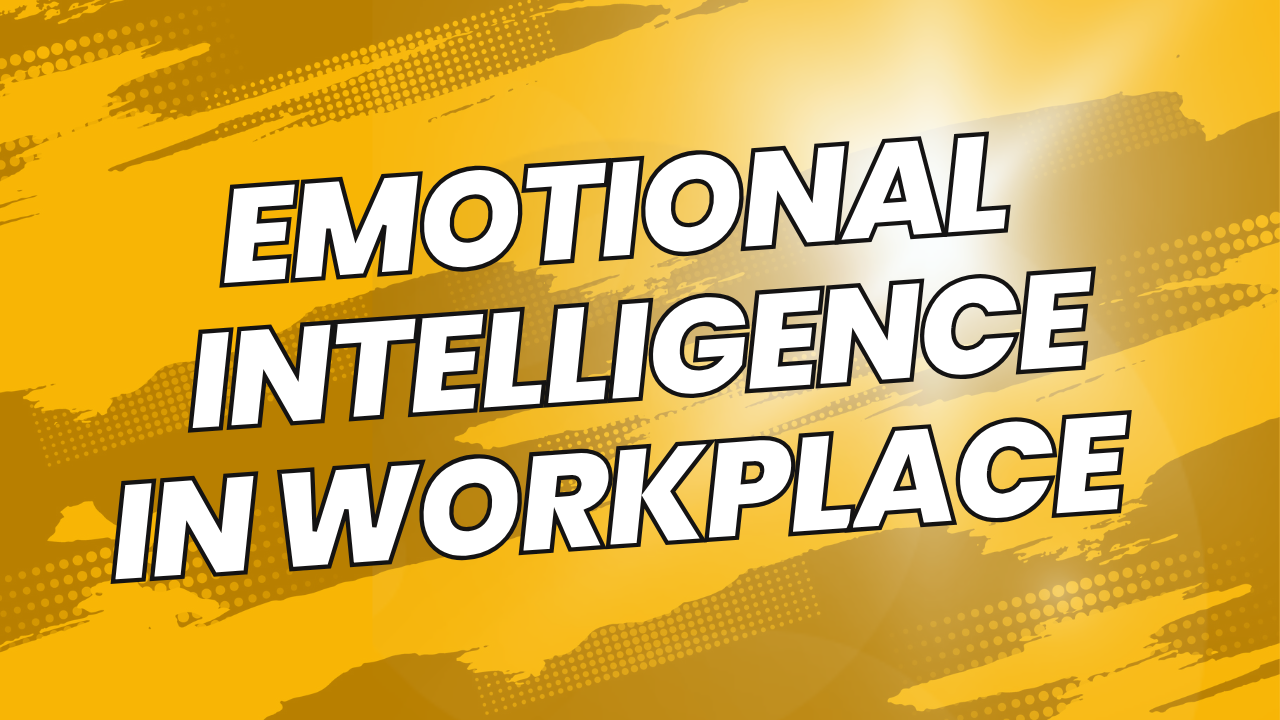Table of Contents
The ability to handle interpersonal relationships, manage emotions, and respond effectively to challenges plays an equally, if not more, significant role. This ability is known as Emotional Intelligence (EI) – a critical skill for job professionals striving to excel in their roles, foster teamwork, and enhance organizational performance.
As workplaces become more collaborative and dynamic, emotional intelligence has emerged as a cornerstone of professional growth and effective leadership. This article explores the importance of emotional intelligence in the workplace and offers insights on how job professionals can develop this invaluable skill.
What is Emotional Intelligence?
Emotional Intelligence, often abbreviated as EI or EQ (Emotional Quotient), refers to the ability to recognize, understand, and manage one’s emotions while also being sensitive to the emotions of others. Daniel Goleman, a renowned psychologist, popularized the concept in his groundbreaking book, Emotional Intelligence: Why It Can Matter More Than IQ.
According to Goleman, emotional intelligence is composed of five key components:
- Self-Awareness: The ability to understand your own emotions, strengths, and weaknesses.
- Self-Regulation: The ability to control impulsive behaviors and adapt to changing circumstances.
- Motivation: A drive to achieve goals for personal fulfillment rather than external rewards.
- Empathy: The capacity to understand and share the feelings of others.
- Social Skills: Proficiency in building relationships, resolving conflicts, and working collaboratively.
In the workplace, these components collectively contribute to improved communication, stronger relationships, and a more positive work environment.
Why Emotional Intelligence Matters in the Workplace
Enhances Communication: Effective communication is the backbone of any successful organization. Job professionals with high emotional intelligence can express their ideas clearly, listen actively, and interpret nonverbal cues, leading to better interactions with colleagues and clients.
For example, understanding a colleague’s tone or body language can help identify their mood or concerns, enabling a more empathetic response. This level of awareness fosters open dialogue and minimizes misunderstandings.
Builds Stronger Relationships: Workplace relationships play a vital role in collaboration and productivity. Professionals with strong emotional intelligence can connect with their peers on a deeper level by showing empathy and understanding.
Leaders, in particular, benefit from this skill. Employees are more likely to trust and respect managers who exhibit emotional intelligence, creating a culture of mutual respect and cooperation.
Boosts Teamwork and Collaboration: In today’s interconnected work environment, teamwork is essential for achieving organizational goals. Emotional intelligence equips professionals with the ability to manage group dynamics effectively, address conflicts constructively, and inspire cooperation.
For instance, during high-pressure projects, emotionally intelligent individuals can manage their stress while motivating others to stay focused and optimistic. This leads to better outcomes and fosters a supportive team environment.
Improves Decision-Making: Emotionally intelligent professionals are better equipped to make informed decisions. By understanding and managing their emotions, they can avoid impulsive reactions and assess situations more objectively.
For example, a project manager faced with a tight deadline might feel stressed. However, high emotional intelligence allows them to remain calm, weigh the available options, and choose the best course of action without letting emotions cloud their judgment.
Enhances Leadership Effectiveness: Leadership is no longer just about delegating tasks and achieving results – it’s about inspiring and empowering teams. Emotional intelligence is a defining trait of successful leaders.
Leaders with high EI can:
- Motivate their teams by understanding individual strengths and challenges.
- Resolve conflicts with empathy and fairness.
- Build trust and foster a sense of belonging among employees.
Such leaders create a positive work environment where employees feel valued and motivated to perform their best.
Reduces Workplace Stress: Workplace stress is a common challenge, often leading to burnout and reduced productivity. Emotional intelligence helps professionals manage their emotions and cope with stress effectively.
For example, self-regulation enables individuals to stay composed under pressure, while empathy allows them to support stressed colleagues. A workplace where employees can openly discuss their emotions and challenges is less likely to experience high levels of stress.
Drives Personal and Professional Growth: Emotional intelligence not only improves workplace performance but also promotes personal growth. Self-awareness and self-regulation encourage individuals to reflect on their behaviors, identify areas for improvement, and strive for continuous development.
Professionals with high EI are more adaptable and open to feedback, making them better equipped to navigate career challenges and seize growth opportunities.
How to Develop Emotional Intelligence in the Workplace
Emotional intelligence is not an innate talent – it’s a skill that can be developed with practice and commitment. Here are practical steps to enhance your EI:
1. Practice Self-Awareness
- Reflect on your emotions and identify their triggers.
- Maintain a journal to record your thoughts and feelings.
- Seek feedback from colleagues to gain insights into your behavior.
2. Cultivate Self-Regulation
- Practice mindfulness and meditation to stay calm under pressure.
- Pause and think before reacting to challenging situations.
- Focus on finding constructive solutions rather than dwelling on problems.
3. Develop Empathy
- Listen actively to understand others’ perspectives.
- Observe nonverbal cues, such as facial expressions and body language.
- Show genuine concern for colleagues’ well-being.
4. Strengthen Social Skills
- Build rapport with colleagues by engaging in meaningful conversations.
- Resolve conflicts with patience and understanding.
- Practice effective communication by being clear, concise, and respectful.
5. Foster Motivation
- Set personal and professional goals that align with your values.
- Celebrate achievements, no matter how small, to stay motivated.
- Surround yourself with positive influences that inspire growth.
Real-Life Examples of Emotional Intelligence in Action
Example 1: Conflict Resolution
In a marketing team, two members have a disagreement over campaign ideas. A team leader with high emotional intelligence listens to both sides, acknowledges their concerns, and finds a middle ground that satisfies both parties. This approach not only resolves the conflict but also strengthens team cohesion.
Example 2: Managing Change
During a company restructuring, employees may feel uncertain and anxious. An emotionally intelligent manager communicates transparently about the changes, addresses employees’ concerns empathetically, and provides support to help them adapt.
Example 3: Enhancing Collaboration
In a collaborative project, one team member feels overwhelmed by their workload. A colleague with high EI notices their stress and offers assistance or suggests redistributing tasks. This gesture fosters trust and improves team morale.
The Business Case for Emotional Intelligence
Organizations that prioritize emotional intelligence benefit from:
- Increased Employee Engagement: Employees are more motivated and committed when they feel understood and valued.
- Better Customer Relationships: Emotionally intelligent employees can connect with customers on a personal level, enhancing satisfaction and loyalty.
- Higher Productivity: Teams with high EI work cohesively, leading to improved efficiency and performance.
- Lower Turnover Rates: A positive and supportive work environment reduces employee attrition.
Our Recommendation
Emotional intelligence is no longer just a desirable trait – it’s a necessity in the modern workplace. For job professionals, it serves as a foundation for effective communication, collaboration, and leadership. By developing emotional intelligence, individuals can unlock their full potential, build stronger relationships, and thrive in their careers.
Whether you’re an entry-level employee or a seasoned leader, investing in emotional intelligence is a step toward professional excellence and a more fulfilling work experience.
Frequently Asked Questions
Emotional intelligence (EQ) refers to the ability to recognize, understand, and manage your own emotions, as well as the emotions of others. In the workplace, EQ is crucial because it helps individuals communicate effectively, resolve conflicts, collaborate with colleagues, and lead teams. High emotional intelligence fosters positive relationships, improves decision-making, and enhances overall productivity.
Leaders with high emotional intelligence are better equipped to motivate their teams, manage stress, and navigate workplace challenges. They can empathize with their employees, provide constructive feedback, and create a supportive work environment. Leaders with strong EQ are also more effective in conflict resolution and decision-making, which leads to better team performance and morale.
Yes, emotional intelligence plays a vital role in conflict resolution. By understanding and managing emotions, individuals can approach conflicts calmly and with empathy. Those with high EQ are more likely to listen actively, consider different perspectives, and find solutions that benefit everyone involved, leading to healthier workplace relationships and reduced tension.
Emotional intelligence enhances teamwork by fostering trust, open communication, and mutual respect. Individuals with high EQ are more adept at managing emotions in group settings, which helps prevent misunderstandings and conflicts. They can also provide emotional support to colleagues, which strengthens team cohesion and promotes a collaborative work culture.
To improve emotional intelligence, focus on developing self-awareness and self-regulation. Practice active listening, empathy, and mindful communication. Seek feedback from others and reflect on how your emotions impact your behavior. You can also attend workshops, read books, or participate in coaching programs focused on emotional intelligence to build these essential skills.

Shridhar is a passionate career coach and expert writer with a focus on professional growth, job search strategies, and personal development. With years of experience in the corporate world, Shridhar understands the challenges professionals face in advancing their careers.


